新概念英语第一册第9课
- 格式:ppt
- 大小:133.50 KB
- 文档页数:34
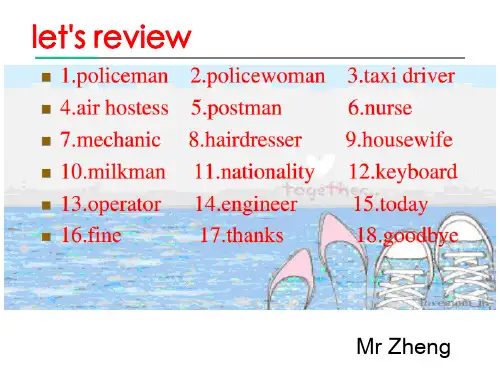
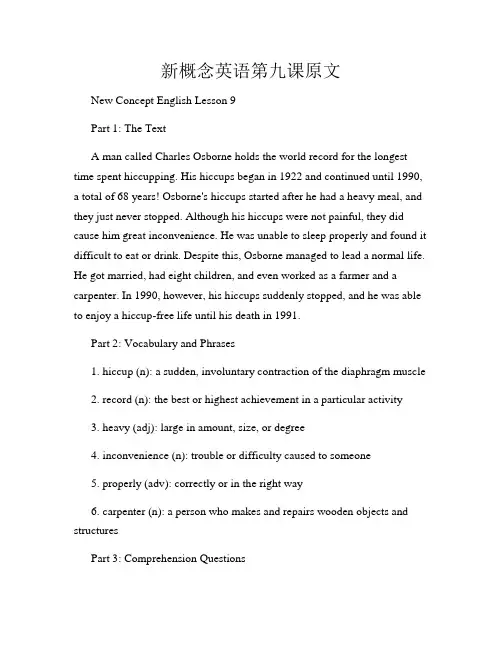
新概念英语第九课原文New Concept English Lesson 9Part 1: The TextA man called Charles Osborne holds the world record for the longest time spent hiccupping. His hiccups began in 1922 and continued until 1990, a total of 68 years! Osborne's hiccups started after he had a heavy meal, and they just never stopped. Although his hiccups were not painful, they did cause him great inconvenience. He was unable to sleep properly and found it difficult to eat or drink. Despite this, Osborne managed to lead a normal life. He got married, had eight children, and even worked as a farmer and a carpenter. In 1990, however, his hiccups suddenly stopped, and he was able to enjoy a hiccup-free life until his death in 1991.Part 2: Vocabulary and Phrases1. hiccup (n): a sudden, involuntary contraction of the diaphragm muscle2. record (n): the best or highest achievement in a particular activity3. heavy (adj): large in amount, size, or degree4. inconvenience (n): trouble or difficulty caused to someone5. properly (adv): correctly or in the right way6. carpenter (n): a person who makes and repairs wooden objects and structuresPart 3: Comprehension Questions1. How long did Charles Osborne's hiccups last?2. What caused Osborne's hiccups?3. How did his hiccups affect his daily life?4. When did Osborne's hiccups finally stop?Part 4: Language Points1. "His hiccups began in 1922 and continued until 1990."- The verb "began" is in the past simple tense, indicating the start of an action in the past.- The verb "continued" is in the past simple tense, indicating the ongoing nature of an action in the past.2. "Although his hiccups were not painful, they did cause him great inconvenience."- The conjunction "although" introduces a contrast between two ideas.- The verb "were" is in the past simple tense, indicating the state of something in the past.- The verb "did cause" is in the past simple tense, indicating the cause and effect relationship between two actions in the past.3. "He was unable to sleep properly and found it difficult to eat or drink."- The verb "was" is in the past simple tense, indicating the state of someone in the past.- The verb "found" is in the past simple tense, indicating the discovery of a difficulty in the past.4. "In 1990, however, his hiccups suddenly stopped, and he was able to enjoy a hiccup-free life until his death in 1991."- The adverb "suddenly" describes the manner in which his hiccups stopped.- The verb "stopped" is in the past simple tense, indicating the end of an action in the past.- The verb "was able to enjoy" is in the past simple tense, indicating the ability to experience something in the past.Part 5: Discussion Questions1. Have you ever experienced hiccups? How did you get rid of them?2. Can you think of any other long-lasting medical conditions that people have experienced?3. How do you think Charles Osborne managed to lead a normal life despite his hiccups?4. Do you know any interesting records or achievements held by individuals?Conclusion:Charles Osborne's 68-year-long hiccups were a remarkable medical phenomenon. Despite the inconvenience they caused, he managed to live afulfilling life. His story serves as a reminder of the resilience of the human spirit in the face of adversity.。
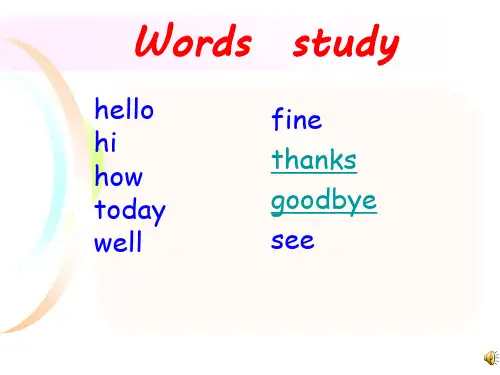
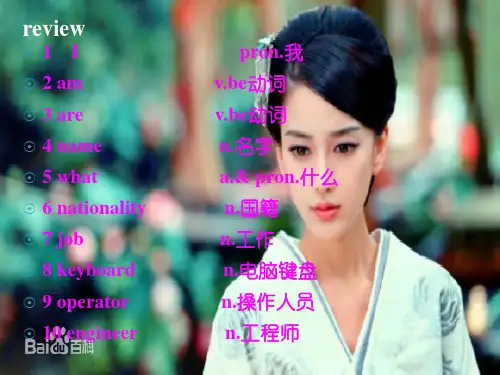
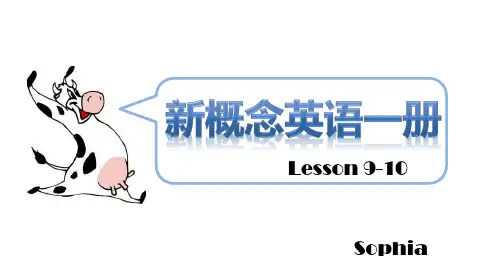
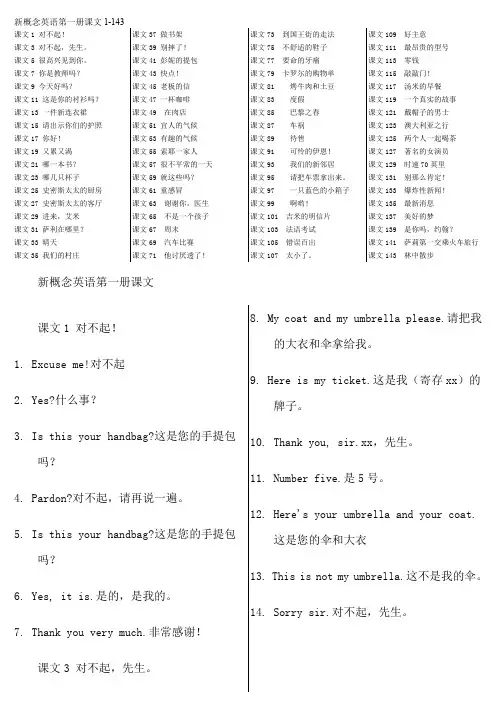
课文1 对不起!课文3 对不起,先生。
课文5 很高兴见到你。
课文7 你是教师吗?课文9 今天好吗?课文11 这是你的衬衫吗?课文13 一件新连衣裙课文15 请出示你们的护照课文17 你好!课文19 又累又渴课文21 哪一本书?课文23 哪几只杯子课文25 史密斯太太的厨房课文27 史密斯太太的客厅课文29 进来,艾米课文31 萨利在哪里?课文33 晴天课文35 我们的村庄课文37 做书架课文39 别摔了!课文41 彭妮的提包课文43 快点!课文45 老板的信课文47 一杯咖啡课文49 在肉店课文51 宜人的气候课文53 有趣的气候课文55 索耶一家人课文57 很不平常的一天课文59 就这些吗?课文61 重感冒课文63 谢谢你,医生课文65 不是一个孩子课文67 周末课文69 汽车比赛课文71 他讨厌透了!课文73 到国王街的走法课文75 不舒适的鞋子课文77 要命的牙痛课文79 卡罗尔的购物单课文81 烤牛肉和土豆课文83 度假课文85 巴黎之春课文87 车祸课文89 待售课文91 可怜的伊恩!课文93 我们的新邻居课文95 请把车票拿出来。
课文97 一只蓝色的小箱子课文99 啊哟!课文101 吉米的明信片课文103 法语考试课文105 错误百出课文107 太小了。
课文109 好主意课文111 最昂贵的型号课文113 零钱课文115 敲敲门!课文117 汤米的早餐课文119 一个真实的故事课文121 戴帽子的男士课文123 澳大利亚之行课文125 两个人一起喝茶课文127 著名的女演员课文129 时速70英里课文131 别那么肯定!课文133 爆炸性新闻!课文135 最新消息课文137 美好的梦课文139 是你吗,约翰?课文141 萨莉第一交乘火车旅行课文143 林中散步新概念英语第一册课文课文1 对不起!1. Excuse me!对不起2. Yes?什么事?3. Is this your handbag?这是您的手提包吗?4. Pardon?对不起,请再说一遍。
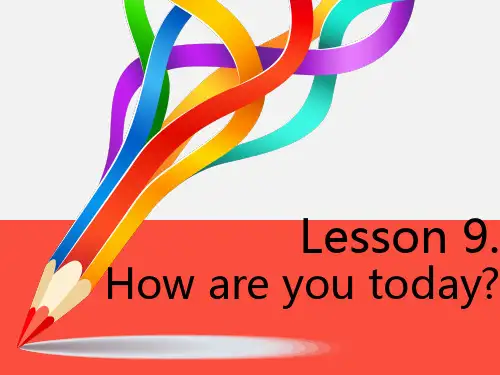
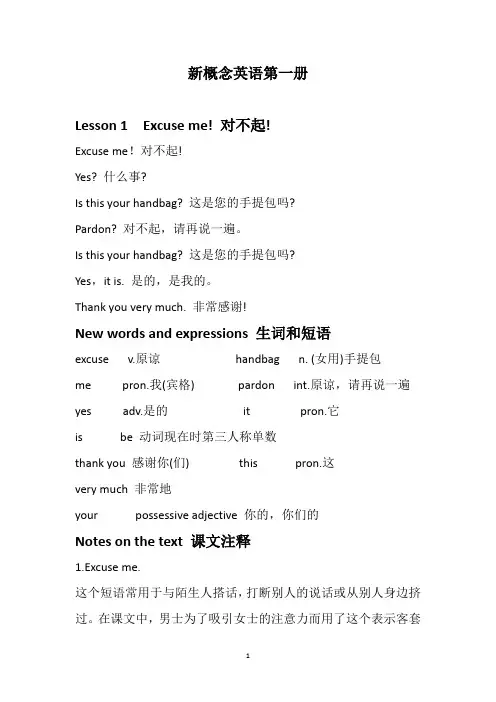
新概念英语第一册Lesson 1 Excuse me! 对不起!Excuse me!对不起!Yes? 什么事?Is this your handbag? 这是您的手提包吗?Pardon? 对不起,请再说一遍。
Is this your handbag? 这是您的手提包吗?Yes,it is. 是的,是我的。
Thank you very much. 非常感谢!New words and expressions 生词和短语excuse v.原谅handbag n. (女用)手提包me pron.我(宾格) pardon int.原谅,请再说一遍yes adv.是的it pron.它is be 动词现在时第三人称单数thank you 感谢你(们) this pron.这very much 非常地your possessive adjective 你的,你们的Notes on the text 课文注释1.Excuse me.这个短语常用于与陌生人搭话,打断别人的说话或从别人身边挤过。
在课文中,男士为了吸引女士的注意力而用了这个表示客套的短语。
2.Pardon?全句为I beg your pardon. 意思是请求对方把刚才讲过的话重复一遍。
Lesson 3 Sorry, sir. 对不起,先生。
My coat and my umbrella please. 请把我的大衣和伞拿给我。
Here is my ticket. 这是我(寄存东西)的牌子。
Thank you, sir. 谢谢,先生。
Number five. 是5号。
Here's your umbrella and your coat. 这是您的伞和大衣。
This is not my umbrella. 这不是我的伞。
Sorry, Sir. 对不起,先生。
Is this your umbrella? 这把伞是您的吗?No, it isn't. 不,不是!Is this it? 这把是吗?Yes, it is. 是,是这把。
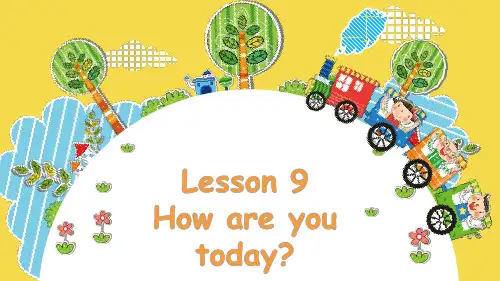
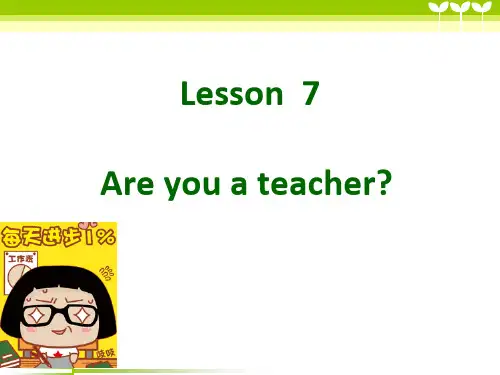
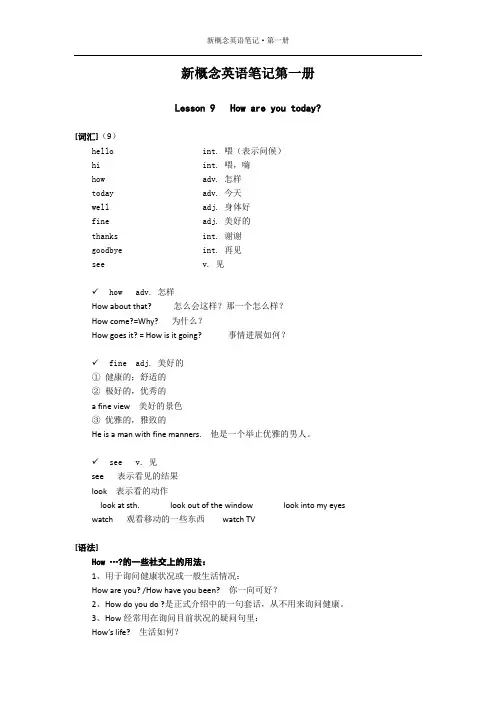
新概念英语笔记第一册Lesson 9 How are you today?[词汇](9)hello int. 喂(表示问候)hi int. 喂,嗨how adv. 怎样today adv. 今天well adj. 身体好fine adj. 美好的thanks int. 谢谢goodbye int. 再见see v. 见✓how adv. 怎样How about that? 怎么会这样?那一个怎么样?How come?=Why? 为什么?How goes it? = How is it going? 事情进展如何?✓fine adj. 美好的①健康的;舒适的②极好的,优秀的a fine view 美好的景色③优雅的,雅致的He is a man with fine manners. 他是一个举止优雅的男人。
✓see v. 见see 表示看见的结果look 表示看的动作look at sth. look out of the window look into my eyes watch 观看移动的一些东西watch TV[语法]How …?的一些社交上的用法:1、用于询问健康状况或一般生活情况:How are you? /How have you been? 你一向可好?2、How do you do ?是正式介绍中的一句套话,从不用来询问健康。
3、How经常用在询问目前状况的疑问句里:How’s life? 生活如何?How are things? 情况怎样?How’s work? 工作怎么样?形容词的意义与作用:1、形容词修饰名词所指的人、物等,说明人、物等是什么样或看上去是什么样的。
2、许多形容词可用以回答What’s…like?这样的问题,并可根据上下文给出笼统或确切的信息。
What’s Tom like?He’s very fat.3、英语中形容词作定语时一般置于名词之前。
新概念英语第一册第9课笔记一、单词。
1. How are you today?- how:疑问副词,用于询问方式、程度、健康状况等。
在这里是询问健康状况,可译为“怎么样”。
- are:be动词的第二人称单数和复数形式(you作主语时),在这里表示“是”,与how连用构成特殊疑问句,询问对方的状态。
- you:第二人称代词,主格和宾格同形,在这里作主语,意为“你;你们”。
- today:名词,意为“今天”,作时间状语。
2. well.- 作形容词时,意为“健康的;良好的”。
例如:I'm well.(我身体很好。
)- 作副词时,意为“很好地;充分地;满意地”。
例如:He can speak English well.(他英语说得很好。
)在课文中是形容词,表示健康状况良好。
3. fine.- 形容词,意为“美好的;健康的;(天气)晴朗的”。
在课文中表示健康状况良好,和well意思相近。
例如:I'm fine, thank you.(我很好,谢谢你。
)4. thanks.- 名词,复数形式,意为“感谢;谢谢”,是thank的复数形式。
通常用于对别人的问候、帮助等表示感谢。
例如:Thanks a lot.(多谢。
)也可以单独使用,如课文中的“Thanks.”二、课文重点句型。
1. How are you today?- 这是英语中常见的问候语,用于询问对方当天的身体状况或整体状态。
回答通常是“I'm fine, thank you.”或者“I'm well, thanks.”等。
2. I'm fine, thank you. And you?- 这是对“How are you?”的标准回答。
“I'm fine, thank you.”表示“我很好,谢谢你。
”“And you?”是“And how are you?”的简略形式,用于反问对方的情况。
三、语法。
1. be动词的用法。
新概念英语第一册第九课课文Lesson 9 How are you today? 今天好吗?Listen to the tape then answer this question. How is Emma? 听录音,然后回答问题。
埃玛身体好吗?STEVEN: Hello, Helen.HELEN: Hi, Steven.STEVEN: How are you today?HELEN: I'm very well, thank you.And you?STEVEN: I'm fine, thanks.STEVEN: How is Tony?HELEN: He's fine, thanks.How's Emma?STEVEN: She's very well, too, Helen.STEVEN: Goodbye, Helen.Nice to see you.HELEN: Nice to see you, too, Steven.Goodbye.参考译文史蒂文:你好,海伦海伦:你好,史蒂文史蒂文:你今天好吗?海伦:很好,谢谢你。
你好吗?史蒂文:很好,谢谢。
史蒂文:托尼好吗?海伦:他很好,谢谢。
埃玛好吗?史蒂文:她也很好,海伦。
史蒂文:再见,海伦。
见到你真高兴。
海伦:我见到你也很高兴,史蒂文。
再见。
单词:1 hello[hə'ləu] int.喂(表示问候)2 hi[hai] int.喂,嗨3 how [hau] ad.怎样4 today [tə'dei] ad.今天5 well [wel] a.身体好6 fine [fain] a.美好的7 thanks [θæŋks] int.谢谢8 goodbye [ˌgud'bai] int.再见9 see [si:] v.见语法:1、以How 引导的特殊疑问句在英语中,特殊疑问句常常以"How"或"What"开头,用于询问特定的信息或表达特定的观点。
《新概念英语第一册第9课课文及详解》1. 引言作为学习英语的学生,我们经常会接触到各种各样的课文和教材。
其中,《新概念英语》系列是非常经典的英语教材之一。
今天我将为大家详细解读《新概念英语》第一册第9课的内容,帮助大家更好地理解这篇课文。
2. 课文内容概述让我们来简要介绍一下这篇课文的内容。
这篇课文主要讲述了一个有关天文的故事。
故事中的主人公是一个名叫汤姆的男孩,他对天文非常感兴趣,希望成为一名天文学家。
汤姆的梦想是通过望远镜观察星星,并发现新的星体。
3. 从简到繁,由浅入深我们首先从课文的词汇和句子结构开始解读,了解文章的基本意思。
课文中出现了一些关于天文的专业术语,比如“telescope”(望远镜)、“discovery”(发现)等。
句子结构相对简单,适合初学者阅读和理解。
我们可以深入探讨汤姆对天文的兴趣和他的梦想。
从这个角度来解读课文,可以引导读者思考人与自然、人与宇宙的关系,以及个人的梦想与追求。
4. 思考与总结在总结部分,我们可以对课文的主题和内容进行全面的回顾和思考。
这样能够帮助读者更全面、深刻地理解课文,并启发读者对自然科学和个人成长的思考。
5. 个人观点和理解从我的个人观点来看,这篇课文不仅仅是一篇简单的英语阅读材料,更是激发学生对天文、自然科学甚至个人理想的故事。
对于学生而言,通过深入的解读和理解,我们可以从中学习到更多的知识,同时也能激发我们对未知世界的好奇心和探索欲。
6. 总结通过本文对《新概念英语》第一册第9课课文的详细解读,相信大家已经对这篇课文有了更深入的了解。
通过深度和广度兼具的探讨,我们可以更全面地理解课文的内涵,以及其中蕴含的更深层次的意义和价值。
希望大家能够在阅读中不断提升自己的阅读理解能力,同时也能够享受到阅读带来的乐趣。
新概念英语第一册第9课的课文主要讲述了一个有关天文的故事。
主人公汤姆对天文非常感兴趣,他希望成为一名天文学家,通过望远镜观察星星,并发现新的星体。
新概念英语第一册课文全中文课文1 对不起!什么事?”这是您的手提包吗?”对不起,请再说一遍。
”这是您的手提包吗?”是的,是我的。
”非常感谢!”课文3 对不起,先生。
请把我的大衣和伞拿给我。
”这是我寄存东西的牌子。
”谢谢,先生。
”是5号。
”这是您的伞和大衣。
”对不起,先生。
”这把伞是您的吗?”不,不是!”这把是吗?”是,是这把。
”非常感谢。
”课文5 很高兴见到你。
早上好。
”早上好,XXX先生。
”这位是XXX。
”XXX是个新学生。
”她是法国人。
”XXX,这位是XXX。
”他是德国人。
”很高兴见到你。
”这位是直子。
”她是日本人。
”很高兴见到你。
”这位是XXX。
”他是韩国人。
”很高兴见到你。
”这位是XXX。
”他是中国人。
”很高兴见到你。
”这位是XXX。
”她也是中国人。
”很高兴见到你。
”课文7 你是教师吗?我是个新学生,我的名字叫XXX。
”很高兴见到你。
”我的名字叫XXX。
”你是法国人吗?”是的,我是法国人。
”你也是法国人吗?”不,我不是。
”你是哪国人?”我是意大利人。
”你是教师吗?”不,我不是。
”你是做什么工作的?”我是电脑录入员。
”你是做什么工作的?”我是工程师。
”课文9 今天好吗?你好,XXX。
”你好,XXX。
”你今天好吗?”很好,谢谢你。
”你好吗?”很好,谢谢。
”XXX好吗?”他很好,谢谢。
”XXX好吗?”她也很好,XXX。
”再见,XXX。
”见到你真高兴。
”我见到你也很高兴,XXX。
”再见。
”课文11 这是你的衬衫吗?那是谁的衬衫?”XXX,这是你的衬衫吗?”不,先生。
”这不是我的衬衫。
”这是我的衬衫。
”我的衬衫是蓝色的。
”这件衬衫是XXX的吗?”也许是,先生。
”XXX的衬衫是白色的。
”XXX!”什么事,先生?”这是你的衬衫吗?”是的,先生。
”给你。
”接着!”谢谢您,先生。
”课文13 一件新连衣裙你的新连衣裙是什么颜色的?”是绿色的。
”到楼上来看看吧。
”谢谢。
”瞧,就是这件。
”这是件很好看的衣服。
”真漂亮。